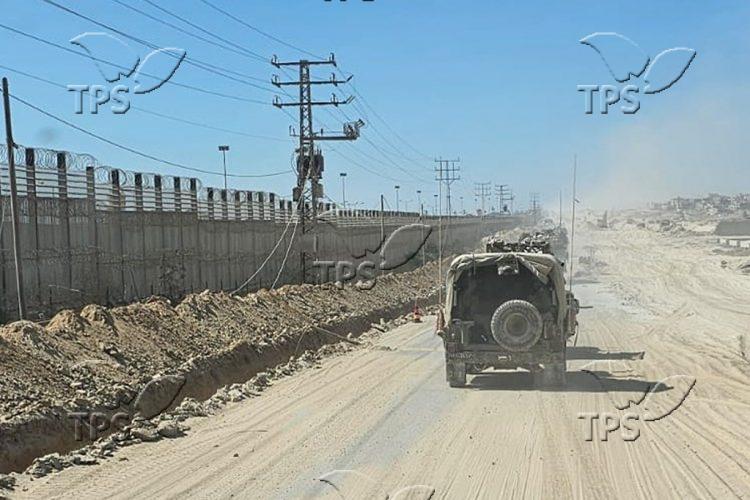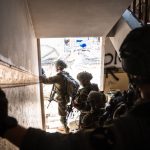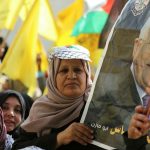As Diplomacy Stalls, Israel Expands Control Over Gaza’s Key Corridors
Jerusalem, 27 August, 2024 (TPS-IL) -- As diplomats continue pushing for a ceasefire in Gaza, the thorniest issue continues to be the presence of Israeli forces in the Gaza-Egypt border area and along a key corridor dividing the northern and southern sides of the Strip.
Israel is not waiting for Hamas to agree. While Hamas rejects Egyptian and Qatari mediation proposals, Israel is expanding the Netzarim Corridor, a roughly seven-km-road running from east to west, that bisects the Strip. It crosses from Israel, at a point between Kibbutz Be’eri and Kibbutz Nahal Oz, and stretches to the Mediterranean.
Located just south of Gaza City, Palestinians who fled fighting in northern Gaza must cross the Netzarim corridor to return to their homes.
Satellite photographs seen by The Press Service of Israel that military outposts and positions have been added in recent days along the route.
Referring to the Netzarim Corridor, senior Israeli military officials told TPS-IL, “Engineering shapes reality.”
Described by an officer from the Southern Command as a “stranglehold” on Hamas, it is not merely a traffic route but a strategic base for Israeli military operations. In some places, it is two kilometers wide and has been instrumental in various military actions, including raids on the Shifa hospital and operations aimed at rescuing hostages in the central Gaza area of Nuseirat.
The separation of northern and southern Gaza is of enormous military and political importance. Israel is prepared to allow Palestinians to return to their homes in the north but insists on monitoring the passage of people to screen out terrorists and weapons. Hamas demands no Israeli forces remain in Gaza. Terror squads are coordinating attacks on the Israeli soldiers securing the Netzarim corridor, and the army has suffered a number of casualties only recently there.
The Philadelphi Corridor
In southern Gaza, the Philadelphi Corridor has similarly tightened Israel’s grip on Hamas. This corridor is a buffer zone that runs the length of the 14-km Gaza-Egypt border. It was created in 2006 to prevent weapons smuggling after Israel disengaged from the Strip but Hamas violently seized control of Gaza from the Palestinian Authority the following year.
Recent comments by Israeli Defense Minister Yoav Gallant indicate that over 150 tunnels have been discovered in this area, an average of one tunnel every 100 meters.
Control of the Philadelphi Corridor impacts the flow of humanitarian aid deliveries. Aid coming into Gaza via the Kerem Shalom crossing was hijacked by militias and criminal gangs who gave Hamas a cut of the takings. A Palestinian resident of Gaza explained to TPS-IL, “The price of moving a truck was $27,000” in protection money. Otherwise, half the contents of the truck would simply be stolen. But the resident told TPS-IL this practice has ended in Rafah and the rest of the Philadelphi corridor.
The Israel Defense Force’s control over the Kerem Shalom and Rafah border further complicates Hamas’s ability to control resources and aid distribution. This control has been a point of contention in negotiations with Egypt, which has expressed opposition to the IDF’s presence in the area. Egypt has proposed an underground barrier and seeks a Palestinian agreement to manage the Rafah crossing internally. Israel does not trust the Palestinian Authority to manage the border crossings.
Asked about the Philadelphi Corridor, IDF Spokeman Rear Adm. Daniel Hagari said on Tuesday the army is continuing to monitor the area and destroy terror infrastructure.
“The government will decide when or what to do. The IDF’s job is to make the sure the government has all kinds of options,” Hagari said.
At least 1,200 people were killed, and 252 Israelis and foreigners were taken hostage in Hamas’s attacks on Israeli communities near the Gaza border on October 7. Of the 104 remaining hostages, more than 30 have been declared dead. Hamas has also been holding captive two Israeli civilians since 2014 and 2015, and the bodies of two soldiers killed in 2014.







